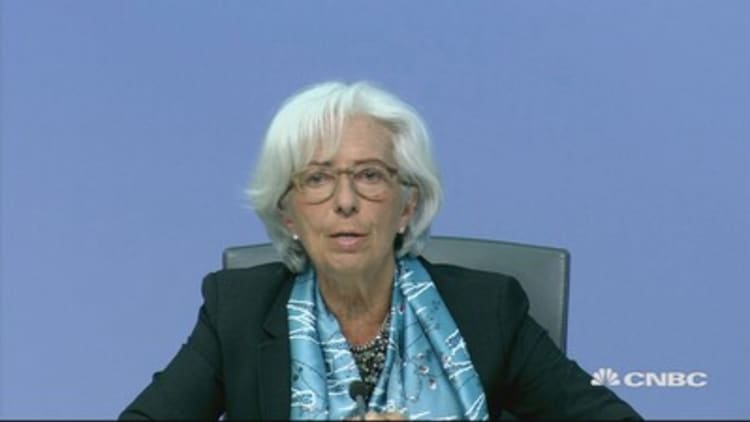The European Central Bank is expected to keep buying government bonds for the foreseeable future after slashing its own inflation forecasts until 2022.
Inflation can be described as a general increase in consumer prices and it's the ECB's mandate to ensure it stays "below, but close to, 2%." That task has been somewhat difficult in the aftermath of the sovereign debt crisis of 2011, and the recent shock from the coronavirus has wrecked the path of inflation even more.
"Emergency purchases will continue for a very long time," Marco Valli, the head of macro research at UniCredit, said in a note Thursday.
The ECB announced an emergency program in March to mitigate the economic impact of the coronavirus crisis. Since then the central bank has been buying government bonds on more relaxed terms than before, to help prop up the euro area.
On Thursday, the ECB expanded that program — dubbed the PEPP (Pandemic Emergency Purchase Program) — in size to a total of 1.35 trillion euros ($1.53 trillion) and with the duration extended until June 2021.
Valli, from UniCredit, said he expects this termination date to be postponed. Other analysts are also of the opinion the ECB will keep buying government debt beyond June 2021.

"With inflation forecast clearly below 2% in 2022, more monetary stimulus further down the road should not be excluded," Carsten Brzeski, the chief economist at ING Germany, said Thursday.
Meanwhile, analysts at Bank of America also said in a note that "all in all, we think the ECB is probably not off the hook for very long with today's package. In December at the latest, we think more decisive action from the ECB is needed."
There are two main reasons behind this view: inflation expectations have deteriorated, and the level of daily purchases is too high compared to the total size of the PEPP program.
The ECB said Thursday the euro zone will finish 2020 with an inflation rate of 0.3%. This is seen picking up to 0.8% and 1.3% in 2021 and 2022, respectively. In comparison, the central bank estimated in March an inflation rate of 1.1%, 1.4% and 1.6% for 2020, 2021 and 2022 respectively.
Frederik Ducrozet, senior economist at Pictet Wealth Management, said the downward revision for 2022 "is the lowest medium-term inflation projection from the ECB staff since the quarterly projections were first published six years ago, (and) the same as in December 2014 before QE (quantitative easing) was launched."

The ECB began buying governments bonds in 2015 after the sovereign debt crisis sparked an economic shock in the region. This kind of stimulus was halted in 2018 as inflation got closer to the bank's mandate, but it was then restarted at the end of 2019 after more disappointing data.
Ducrozet also said that if the ECB keeps buying government bonds under the PEPP program at the current rate — around 6 billion euros per day — it will achieve the 1.35 trillion euro limit in February of 2021.
"In order for the ECB to maintain a steady pace of purchases or around 6 billion euros per day until June 2021, we would expect a decision to increase the PEPP envelope by 500 billion euros, to 1.85 trillion euros, to be made in September," he said.


